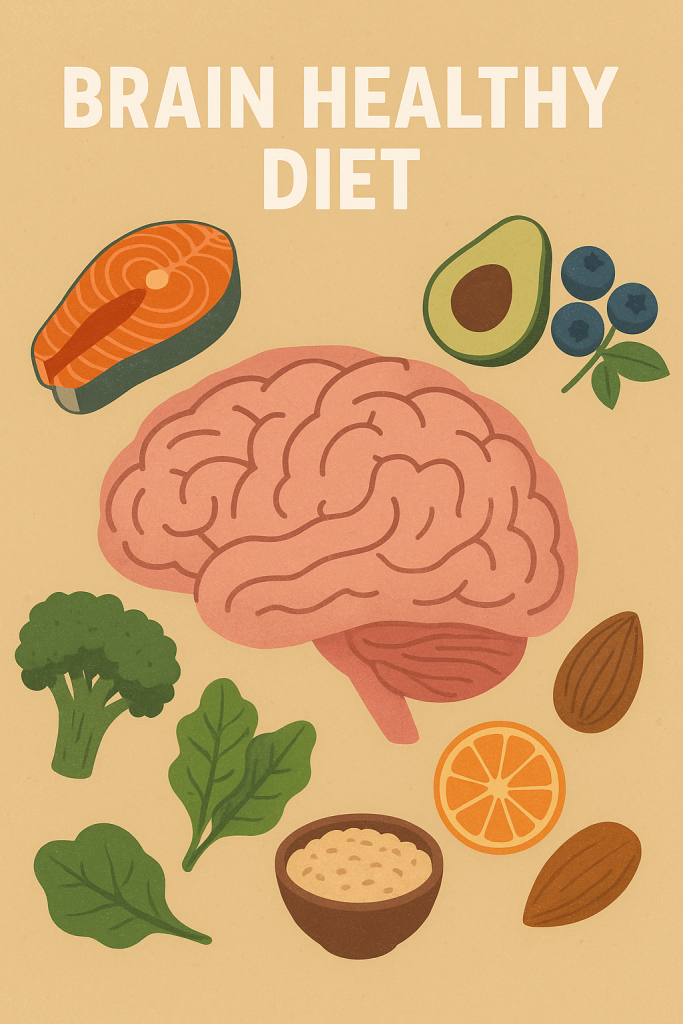When it comes to health, we often think about fitness, weight, or heart health first. But what about the organ that controls it all—your brain? A Brain Healthy Diet is more than a trend; it’s a science-backed lifestyle approach that fuels your brain for better focus, stronger memory, and long-term protection against cognitive decline.
Research shows that what we eat directly impacts brain performance. Nutrient-rich foods improve communication between neurons, support mood balance, and even protect against Alzheimer’s disease. On the other hand, highly processed foods, sugars, and unhealthy fats can slow thinking, increase brain fog, and raise the risk of neurodegenerative disorders.
In this post, we’ll break down the essentials of the Brain Healthy Diet, highlight the best brain-boosting foods, share practical strategies to eat for mental clarity, and explore studies that show how nutrition shapes cognitive performance.
Why a Brain Healthy Diet Matters
Your brain makes up only 2% of your body weight, but it uses about 20% of your daily energy intake. That means the food you eat has a huge impact on mental sharpness, mood regulation, and memory retention.
The Science Behind Nutrition and Brain Health
The brain needs:
- Glucose from complex carbs for steady energy.
- Healthy fats, especially omega-3s, to build brain cell membranes.
- Amino acids from protein to make neurotransmitters like serotonin and dopamine.
- Antioxidants to fight oxidative stress linked to aging and Alzheimer’s.
- Vitamins & minerals like B12, folate, magnesium, and zinc for brain signaling.
📊 Study Spotlight:
A 2017 study published in Frontiers in Aging Neuroscience found that diets rich in omega-3s, antioxidants, and leafy greens slowed age-related cognitive decline compared to diets high in saturated fats and processed foods.
Core Principles of the Brain Healthy Diet
The Brain Healthy Diet is not about restriction; it’s about eating foods that support memory, mental energy, and resilience.
The Main Principles
- Prioritize Whole Foods – Eat unprocessed, nutrient-dense foods.
- Emphasize Healthy Fats – Include omega-3s and monounsaturated fats.
- Eat the Rainbow – Fill your plate with colorful fruits and vegetables.
- Balance Blood Sugar – Choose slow-digesting carbs over refined sugars.
- Stay Hydrated – Even mild dehydration can impair focus and memory.
The MIND Diet Connection
The MIND diet, developed by researchers at Rush University, combines the Mediterranean and DASH diets and has been shown to lower Alzheimer’s risk by up to 53% in some studies. It’s essentially a framework for the Brain Healthy Diet, emphasizing:
- Green leafy vegetables
- Nuts
- Berries
- Beans
- Whole grains
- Fish
- Olive oil
Foods That Fuel the Brain
Top Brain-Boosting Foods
- Fatty Fish – Salmon, sardines, and mackerel are rich in DHA and EPA, essential omega-3 fatty acids linked to improved memory.
- Blueberries – Packed with antioxidants that protect neurons from oxidative stress.
- Leafy Greens – Spinach, kale, and collard greens contain folate, vitamin K, and lutein for brain health.
- Nuts & Seeds – Walnuts, almonds, flaxseeds, and chia seeds provide vitamin E and omega-3s.
- Avocados – High in monounsaturated fats that support blood flow to the brain.
- Whole Grains – Oats, brown rice, and quinoa supply steady glucose for energy.
- Dark Chocolate – Rich in flavonoids that improve blood flow and cognitive function.
📊 Study Spotlight:
A 2012 study in Annals of Neurology found that women who ate two or more servings of blueberries or strawberries per week experienced slower rates of cognitive decline.
Foods to Limit or Avoid
❌ Sugary drinks – Cause blood sugar spikes that impair focus.
❌ Trans fats – Found in fried and processed foods, linked to memory decline.
❌ Highly processed carbs – White bread, pastries, and sweets increase brain fog.
❌ Excess alcohol – Damages brain cells and disrupts sleep.
Lifestyle Habits That Enhance the Brain Healthy Diet
Exercise and Brain Power
Exercise boosts blood flow to the brain, encourages new neuron growth, and improves memory. Pairing a Brain Healthy Diet with 150 minutes of moderate exercise per week maximizes cognitive benefits.
Sleep and Brain Function
Sleep clears out toxins that build up during the day. A diet rich in magnesium (from nuts and seeds) and tryptophan (from turkey, eggs, and dairy) supports deeper sleep cycles.
Stress Reduction and Brain Health
Chronic stress shrinks the hippocampus, the brain’s memory center. Pairing a Brain Healthy Diet with mindfulness or yoga reduces cortisol levels and preserves brain volume.
Practical Strategies to Start a Brain Healthy Diet
Step 1 – Fill Half Your Plate with Vegetables
Leafy greens, cruciferous veggies, and colorful vegetables provide the antioxidants and vitamins your brain craves.
Step 2 – Include Omega-3s Daily
Eat fatty fish twice a week, add chia seeds to smoothies, or sprinkle walnuts on salads.
Step 3 – Choose Smart Carbs
Opt for oats or quinoa instead of refined bread and pasta to stabilize blood sugar.
Step 4 – Hydrate Mindfully
Drink at least 6–8 glasses of water daily; dehydration reduces attention span.
Step 5 – Snack Smart
Swap chips for mixed nuts, dark chocolate squares, or berries.
💡 Example: Instead of a mid-afternoon sugary latte, try green tea with a handful of almonds. This provides caffeine plus L-theanine, which improves focus without jitters.
Brain Healthy Diet for Different Ages
Children and Teens
Omega-3s and protein are vital for growing brains. Encourage nuts, eggs, and whole grains for school performance.
Adults
Focus on stress management and blood sugar control to stay productive and sharp.
Seniors
Antioxidants, omega-3s, and B vitamins help prevent cognitive decline and dementia.
📊 Study Spotlight:
The Chicago Health and Aging Project showed that seniors following a MIND-style diet had a significantly lower risk of Alzheimer’s.
Brain Healthy Diet and Weight Management
The Brain Healthy Diet isn’t just about memory—it also supports a healthy weight. By choosing nutrient-dense foods and avoiding refined sugars, you naturally regulate appetite and reduce cravings.
💡 Case Study: Maria, 42, switched from refined snacks to nuts and berries. Within 3 months, she noticed improved concentration at work and lost 10 pounds without strict calorie counting.
Brain Healthy Diet vs Other Diets
- Keto Diet: Provides ketones that may improve focus short-term, but lacks long-term evidence for memory preservation.
- Mediterranean Diet: A strong foundation for brain health, emphasizing olive oil, fish, and vegetables.
- Paleo Diet: Encourages whole foods but excludes beneficial whole grains and legumes.
- Brain Healthy Diet (MIND-inspired): Balanced, sustainable, and backed by long-term research.
Common Challenges and How to Overcome Them
- Busy Lifestyle – Meal prep brain-healthy snacks like trail mix.
- Sugar Cravings – Replace sweets with dark chocolate or fruit.
- Budget Concerns – Buy frozen berries and canned salmon for affordable nutrients.
- Old Habits – Shift gradually—swap one unhealthy food at a time.
A 7-Day Brain Healthy Diet Meal Plan (Sample)
Day 1 – Oatmeal with blueberries, grilled salmon, quinoa salad
Day 2 – Avocado toast, Greek yogurt with walnuts, stir-fried veggies
Day 3 – Smoothie with spinach and chia seeds, lentil soup, grilled chicken
Day 4 – Scrambled eggs with kale, whole grain wrap, roasted sweet potatoes
Day 5 – Greek salad, sardines on whole-grain crackers, roasted veggies
Day 6 – Overnight oats with flax, grilled shrimp, brown rice bowl
Day 7 – Green smoothie, hummus with carrots, baked trout with spinach
FAQ on the Brain Healthy Diet
Q1: Can the Brain Healthy Diet help prevent Alzheimer’s?
Yes—studies suggest diets like the MIND diet, which overlap with the Brain Healthy Diet, reduce Alzheimer’s risk by up to 53%.
Q2: Do I need supplements?
Not always. If you lack omega-3s or B12 (especially vegetarians), supplements can help.
Q3: How soon will I notice results?
Many people report improved focus and mood in as little as 2–3 weeks.
Q4: Can kids follow this diet?
Yes—it supports healthy brain development in children and teens.
Final Thoughts – Eating for Brain Power
Your brain deserves as much care as your heart or muscles. A Brain Healthy Diet provides the nutrients, antioxidants, and healthy fats your mind needs to thrive. By eating more whole foods, managing stress, and making mindful choices, you’ll not only boost focus and memory today—you’ll also protect your brain for decades to come.
The takeaway is simple: every bite matters. Choose foods that fuel your brain, and you’ll notice sharper thinking, better mood, and a stronger defense against cognitive decline.
Related Resource
Curious how meal timing can enhance cognitive function and support a brain-focused lifestyle? Explore our detailed guide on the benefits of 16/8 fasting once a week—a gentle, flexible approach that can complement a Brain Healthy Diet and support mental clarity.



